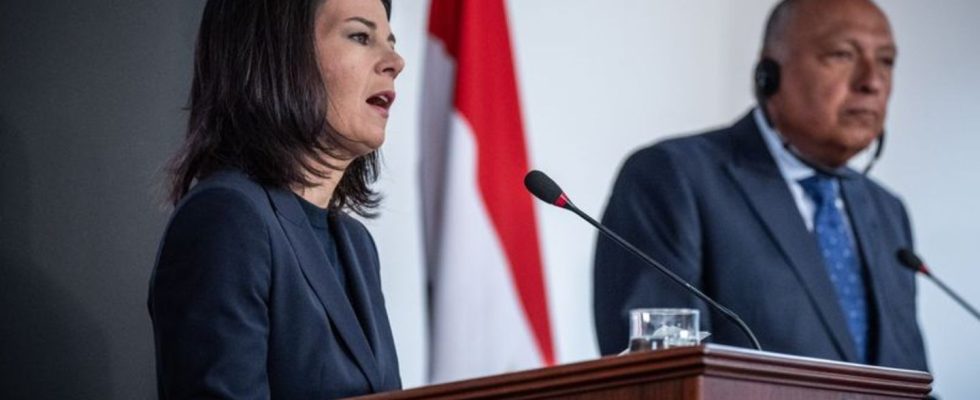War in the Middle East
Baerbock in Egypt: Focus on the humanitarian situation in Gaza
Federal Foreign Minister Annalena Baerbock is visiting her Egyptian counterpart Samih Schukri. photo
© Michael Kappeler/dpa
One of the most important supply routes for aid supplies runs through Egypt. Baerbock is calling for a new ceasefire in order to provide better care for the Palestinians there. The chances of this are not particularly good.
What is needed is a significantly less intensive, more targeted anti-terror operation by the Israeli army. “And we need more humanitarian breaks so that significantly more help can be distributed to the people,” said the Green politician at a meeting with Egyptian Foreign Minister Samih Schukri in the new capital east of Cairo.
Visit to Rafah
Baerbock then wants to travel to the coastal town of Al-Arisch on the Mediterranean and then to Rafah, the Egyptian border crossing with the Gaza Strip. The majority of international aid deliveries to the Gaza Strip continue to flow from there. At the beginning of her Middle East visit to Jerusalem on Sunday, Baerbock had already called on Israel to allow more aid deliveries for the suffering population in Gaza.
Egypt’s Foreign Ministry described efforts for a renewed ceasefire and adequate aid supplies for the Palestinians as inevitable. “The calls for the legitimate rights of the Palestinians have been going on for three decades,” said Shukri. “A mere literal demand for a two-state solution will not achieve this goal.” The current situation in the Gaza war is developing towards the expulsion of the Palestinians, said Schukri. The two million people in the sealed-off coastal strip would be under siege.
Baerbock laments the suffering of innocent Palestinians
“The Israeli army must do more to protect civilians in Gaza,” said Baerbock. “The suffering of so many innocent Palestinians cannot continue,” she said. She spoke very intensively and very long and confidentially with Schukri about how new humanitarian breaks could be achieved “so that people in Israel and Palestine can finally live in peace and security.”
Because this also requires “concrete, very acute measures in the here and now,” Germany has tripled its humanitarian aid for the Palestinians to around 211 million euros and recently also delivered incubators and incubators. Among other things, this would be used to care for injured babies from Gaza in Egypt. A thousand times more is needed, especially in the medical sector, said Baerbock.
The Gaza war was triggered by a terrorist attack by the Islamist Hamas and other extremist Palestinian groups on October 7th. Israel responded with massive air strikes and a ground offensive. In view of the catastrophic humanitarian situation in the sealed-off coastal area and the high number of civilian casualties, Israel has recently come under increasing international criticism.
The Prime Ministers of Spain and Belgium, Pedro Sánchez and Alexander De Croo, had previously visited the Rafah border crossing. They had very sharply criticized Israel’s military actions in the Gaza Strip. After a visit there, the UN High Commissioner for Human Rights, Volker Türk, accused both the Islamist Hamas and Israel of war crimes.
Baerbock: Border crossings bottleneck for aid deliveries
At the start of her multi-day Middle East trip, Baerbock had already called on Israel on Sunday evening to make the processing of aid deliveries to the Gaza Strip more practical in view of the suffering of the Palestinian civilian population in the Gaza Strip. People need food, clean water and medical care.
An important beginning is that in addition to the Rafah border crossing between Egypt and Gaza, Israel has also opened the Kerem Shalom crossing for aid deliveries, she said after talks with Israeli President Izchak Herzog and the new Foreign Minister Israel Katz in Jerusalem. “But the way these border crossings currently work, they are a bottleneck. It cannot stay that way.” More ways to provide humanitarian aid would have to be found.
Talks on Hezbollah planned in Lebanon
Later in the day, Baerbock wants to travel to Lebanon for political talks. Hezbollah’s confrontations in Lebanon with Israel’s army near the border have increased since the start of the Gaza war. After the killing of a Hamas leader and a Hezbollah commander in Lebanon, concerns are growing that the conflict could develop into a regional conflagration.

